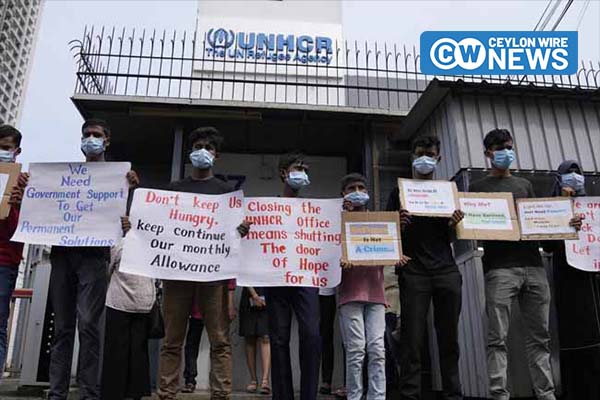Several Rohingya refugees in Sri Lanka staged a protest outside the office of the United Nations refugee agency this week, expressing their discontent over the agency’s decision to close its Sri Lanka office by the end of 2024. In addition to the demonstration, the refugees submitted an appeal to the UN High Commissioner for Refugees (UNHCR) on Tuesday, urging the agency not to abandon them without arranging permanent solutions.
The Rohingya, a predominantly Muslim ethnic group from Myanmar, have faced long-standing challenges as they are not officially recognized among the country’s 135 ethnic groups and have been denied citizenship since 1982, leaving them effectively stateless. Following severe human rights violations in Kachin, Rakhine, and Shan States in 2017, perpetrated mainly by the Myanmar security forces, millions of Rohingya were compelled to flee to Bangladesh.
Despite seeking refuge in Bangladesh, the living conditions for the Rohingya remained challenging, with movement restrictions and shortages of food and medicine after being relocated to an isolated island by authorities. According to the appeal, these refugees, who embarked on a boat journey from Bangladesh in search of a better life, were rescued by the Sri Lanka navy after drifting along the northern coast of the Indian Ocean island nation. Despite being allowed to stay in Sri Lanka temporarily after a period of detention, they were unable to secure citizenship.
In their letter to the UN, the Rohingya refugees implored the UNHCR “not to abandon us and help us find a permanent solution in another country that will help us overcome uncertainty and not make us and our children permanently stateless.”
The refugees also highlighted the critical importance of the monthly allowance provided by the UNHCR for their basic survival, emphasizing that Sri Lanka is not a contracting state to the 1951 Refugee Convention. This lack of status denies them the legal right to work in the country to meet their living, healthcare, and education needs. The refugees called on the UNHCR to engage in negotiations with the Sri Lankan government to secure legal status and requested that their monthly allowance not be discontinued without alternative arrangements.
Referring to a 2018 fact-finding mission report from the Human Rights Council, which called for UN assistance to Myanmar in protecting its people from genocide, crimes against humanity, and war crimes, the refugees urged the UN to establish a trust fund for victim support. However, a 2023 UNHCR report revealed a funding gap of $289,416 for Sri Lanka, representing only 13 percent of the financial requirements. Source: Jurist









